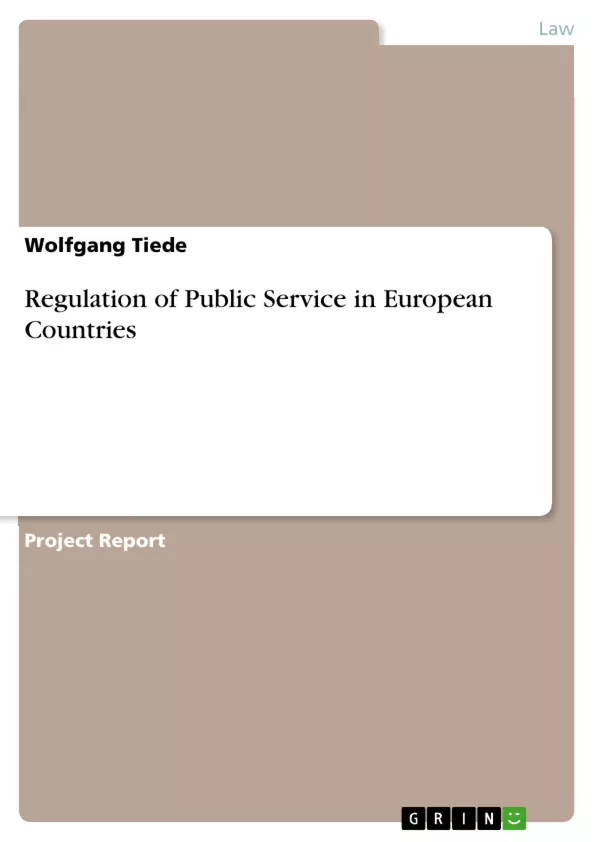Public service both national and local in Europe is characterised by a great diversity and specificity . The institution of public service itself exists in all European countries, but the regulation differs considerably. This is due to several factors which are, among others, the structure of the State, conception of the notion of general interest, impact of decentralisation movements and cultural pluralism of local authorities. The regulation depends mainly on the weighting of the public law governed career system and the civil law governed employment system of public service. Most of the European countries have chosen a hybrid model. Thus, the field of law regulating the personnel of the public service is a mixture of public and civil law.
Three systems of regulation of public service can be observed across Europe, depending on the amount of implication of public law in the public service sector: the employment system (I.), the career system (II.) and hybrid systems (III.). It has to be stated though, that the realisation of pure systems do not exist and that every system is more or less hybrid.
Inhaltsverzeichnis (Table of Contents)
- A. General Outline: Public Service Systems in Europe in Comparative Analysis
- I. Employment System
- II. Career System
- III. Hybrid System
- B. Regulation of Public Service in Germany and France
- I. System of Legislation on the Matters of Municipal Service in Germany
- 1. German Civil Servant Law in the Legal System
- a.) Legislative Competences
- b) Legal Sources of Civil Servant Law
- aa) Constitutional Provisions
- (1) Article 33 para. 2 GG
- (2) Article 33 para. 3 GG
- (3) Article 33 para. 4 and para. 5 GG
- bb) Legal Acts, Statutory Instruments and Administrative Regulations
- 2. Differences to the Regulation of Other Members of Public Service
- II. System of Legislation on the Matters of Municipal Service in France
- 1. The Local Administration of the Communes
- 2. The French Concept of Public Services
- 3. a) The Notion of Public Service
- aa) Definition
- bb) The Principles of Public Services
- (1) Continuity of the Service
- (2) Adaptation of the Service
- (3) Equality
- b) Classification
- aa) The Administrative Public Services (SPA)
- bb) The Industrial and Commercial public Services (SPIC)
- Legal Sources of Public Service Law
- Comparative analysis of public service systems across Europe
- Regulation of public service employment in Germany and France
- Different legal frameworks governing public service
- The influence of public and civil law on public service regulation
- The role of the public service in national and local contexts
Zielsetzung und Themenschwerpunkte (Objectives and Key Themes)
This document aims to provide a comparative analysis of public service systems across Europe, with a particular focus on Germany and France. It examines the different regulatory frameworks governing public service employment and explores the unique features of each system.
Zusammenfassung der Kapitel (Chapter Summaries)
The first chapter provides an overview of the different public service systems prevalent in Europe, highlighting the diversity and specificity of these systems across the continent. It examines the impact of various factors, such as the structure of the state, the concept of general interest, decentralization movements, and cultural pluralism, on the regulation of public service. The chapter then identifies three main models for regulating public service: the employment system, the career system, and hybrid systems.
The second chapter delves into the regulation of public service in Germany and France, focusing on the legal frameworks governing municipal service in both countries. It explores the intricacies of the German Civil Servant Law, including its legal sources, constitutional provisions, and differences from the regulation of other public service members. Additionally, it examines the French concept of public services, exploring its definition, principles, and classification.
Schlüsselwörter (Keywords)
Public service, comparative analysis, regulation, Germany, France, employment system, career system, hybrid system, civil servant law, legal framework, local government, public administration, administrative public services (SPA), industrial and commercial public services (SPIC).
Frequently Asked Questions
What are the three main systems of public service regulation in Europe?
The three observed systems are the employment system, the career system, and the hybrid system, which combines elements of both public and civil law.
How does the German public service system differ from others?
The German system is heavily based on "Civil Servant Law" (Beamtentum) with specific constitutional protections under Article 33 of the Basic Law (GG), distinguishing it from standard private-sector employment.
What is the French concept of "Public Service"?
In France, public service is defined by core principles: continuity of service, adaptation to changing needs, and equality of treatment for all citizens.
What is the difference between SPA and SPIC in France?
SPA (Administrative Public Services) are governed primarily by public law, while SPIC (Industrial and Commercial Public Services) operate more like private businesses and are governed by a mix of public and private law.
Why is there such diversity in public service regulation across Europe?
Diversity stems from different state structures, historical conceptions of "general interest," decentralization movements, and the cultural pluralism of local authorities.
- Quote paper
- Wolfgang Tiede (Author), 2007, Regulation of Public Service in European Countries, Munich, GRIN Verlag, https://www.grin.com/document/169724



